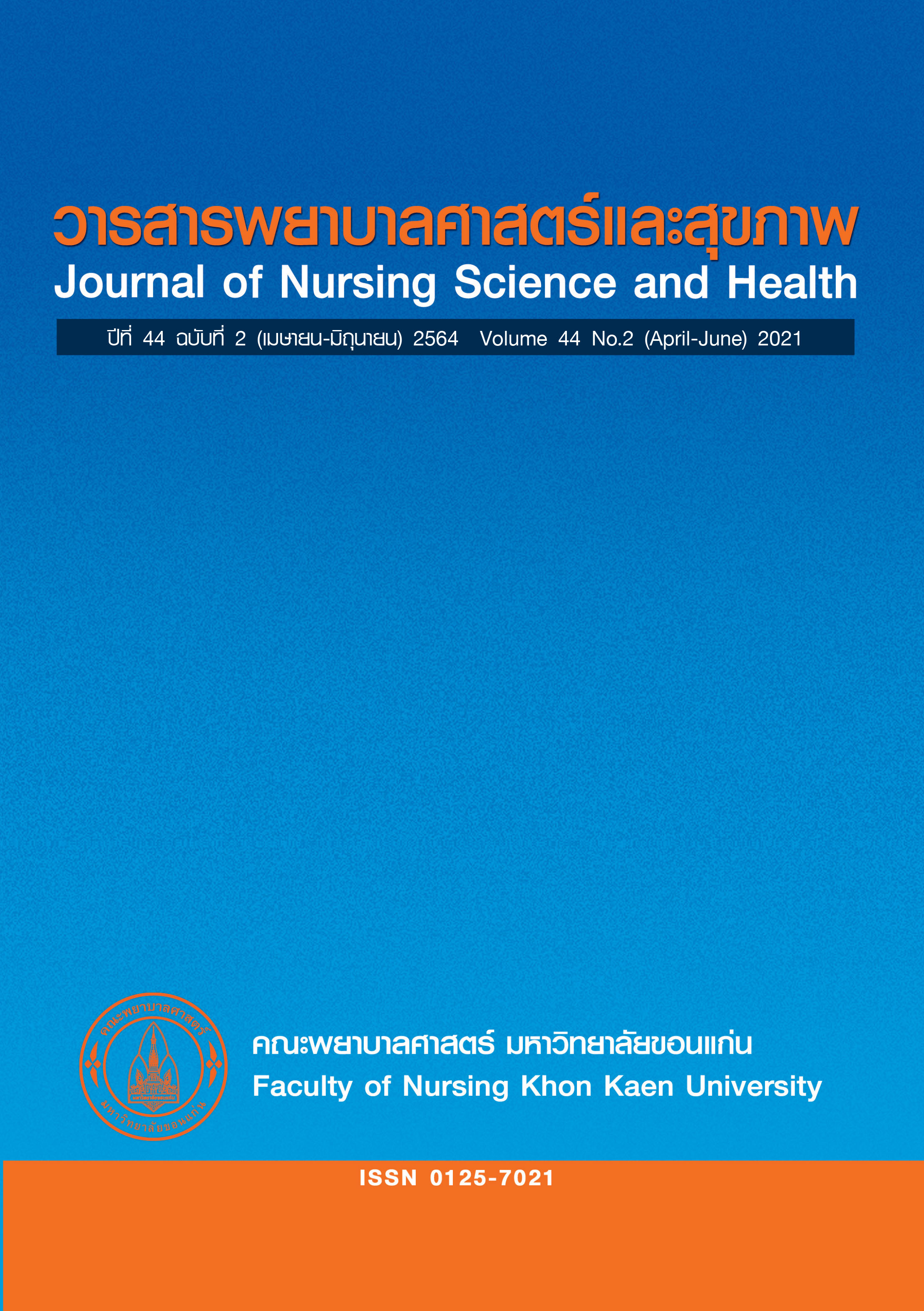Educative-supportive care needs and received among patients with advanced cancer and caregivers
Keywords:
educative-supportive care needs, patients withadvancedcancer, caregiversAbstract
This cross-sectional descriptive research aimed to investigate educative-supportive care needs and received among patients with advanced cancer and caregivers. Orem nursing theory was used as a conceptual framework. Participants were patients with advanced cancer and caregivers, 213 people for each group. Data were collected using a demographic questionnaire and an educative-supportive care needs and received questionnaire. Instrument’s verification obtained content validity index of 0.86 and cronbach’s alpha coefficient of 0.92. Data analysis was carried out using descriptive statistics, Wilcoxon Signed Rank test, and Mann Whitney U test.
Findings showed that patients’ overall educative-supportive care needs and received were at moderate levels. No statistical different was found between educative-supportive care needs and received (Z = -.382, p = .703). Patient had needs regarding knowledge, guiding, and psychological support at high levels; and also received these needs at high levels. Caregivers’ overall educative-supportive care needs were at high levels, especially, needs regarding knowledge and guiding; whereas knowledge and guiding received were at moderate levels. It was found that caregivers’ overall educative-supportive care received was significantly statistical lower than needs (Z = -12.652, p < .001). However, educative-supportive care received of patients and those of caregivers were not significantly different (p > .05).
References
Orem DE. Nursing concept of practice. 6th ed. Missouri: Mosby, Inc; 2001.
Methipisit P, Namvongprom A, Pakdevong N. Outcomes and process of palliative care in patients with advanced cancer. Journal of Nursing Science & Health 2018;41(1):75-83. (in Thai)
Chaichompoo R, Namvongprom A, Pakdevong N. Distress and quality of life among family caregivers of patients with advanced cancer undergoing chemotherapy. Journal of Nursing Science & Health 2017;40(4):41-9. (in Thai)
Makmai S, Sirichayanugul C, Sirichayanugul T. Common symptoms and needs of pre- discharge advanced stage cancer patients: A case-study at Phrae hospital, Thailand. Thai Cancer Journal 2013;33(4):132-45. (in Thai)
American Cancer Society. Advanced cancer [Internet]. Atlanta: American Cancer Society; 2017 [updated 2017; Cited 2017 May 17th]. Available from https://www.cancer.org/acs/ groups/cid/documents/webcontent/003082-pdf.pdf
Kim Y, Given BA. Quality of life of family caregivers of cancer survivors: Across the trajectory of the illness. CANCER supplement 2008;112(11):2556-68. Doi 10.1002/cncr. 23449
Family caregiver alliance. Caregiving 101: On being a caregiver [Internet]. San Francisco: Family caregiver alliance; 2014 [updated 2014; Cited 2017 May 17th]. Available from http://www.caregiver .org/caregiving-101-being-caregiver
National Cancer Institute. Family caregivers in cancer: Roles and challenges (PDQ)-health professional version [Internet]. National cancer Institute; 2016 [updated 2016; Cited 2017 May 17th]. Available from https://www.cancer.gov/about-cancer/coping/family-friends/family-caregivers-hp-pdq#link/_28_toc
Cardoso F, Harbeck N, Mertz S, Fenech D. Evolving psychosocial, emotional, functional, and support needs of women with advanced breast cancer: Results from the count us, know us, join us and here & now surveys. The Breast 2016;28 :5-12.
Fletcher C, Chapman J, Fennell K, Wilson C. The information needs of adult cancer survivors across the cancer continuum: A scoping review. Patient Education and Counseling 2017;100(3):383-410.
Maguire R, Kotronoulas G, Simpson M, Paterson C. A systematic review of the supportive care needs of women living with and beyond cervical cancer. Gynecologic Oncology 2015;136(3): 478-90.
Paterson C, Robertson A, Smith A, Nabi G. Identifying the unmet supportive care needs of men living with and beyond prostate cancer: A systematic review. Eur J Oncol Nurs 2015;19(4): 405-18.
Longacre ML. Cancer caregivers information needs and resource preference. J Cancer Educ 2013;20(2):297-305. Doi 10.1007/s13187-013-0472-2.
Eriksson E, Lauri S. Informational and emotional support for cancer patients’ relatives.Eur J Cancer Care 2000;9(1):8-15. Doi 10.1046/j.1365-2354.2000.00183.x
Bee PE, Barnes P, Luker KA. A systematic review of informal caregivers’ needs in providing home-based end-of-life care to people with cancer. J Clin Nurs 2009;18(10):1379-93. Doi 10.1111/j.1365-2702.2008.02405.x.
Yodying T, Namvongprom A, Pakdevong N. Educative-supportive care needs in patients with advanced cancer undergoing chemotherapy. Journal of Nursing Science & Health 2019;42(4):10-9. (in Thai)
Marzorati C, Bailo L, Mazzocco K, Pravettoni G. Empowerment from patient’s and caregiver’s perspective in cancer care. Health Psychology 2018;5(2):1–7. DOI: 10.1177/2055102918815318
Downloads
Published
How to Cite
Issue
Section
License
The Journal of Nursing Science and Health is copyright holder of published articles. Distributions of articles published in Journal of Nursing Science and Health including online, photocopying which is not for teaching-learning purpose, publication submission elsewhere are prohibited except obtaining permission from the Journal of Nursing Science and Health.



